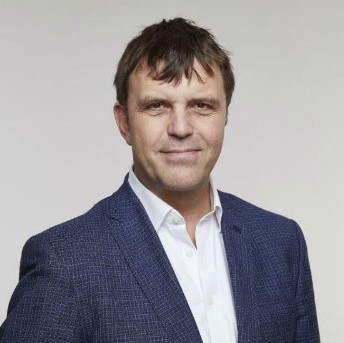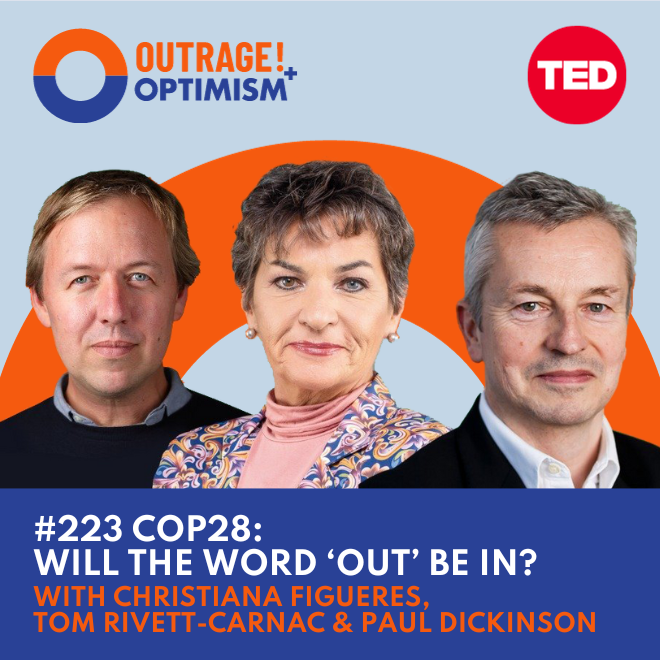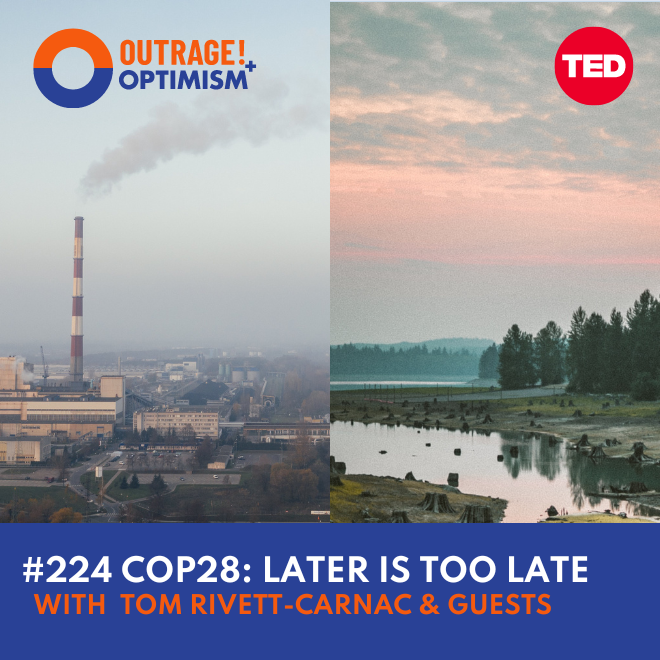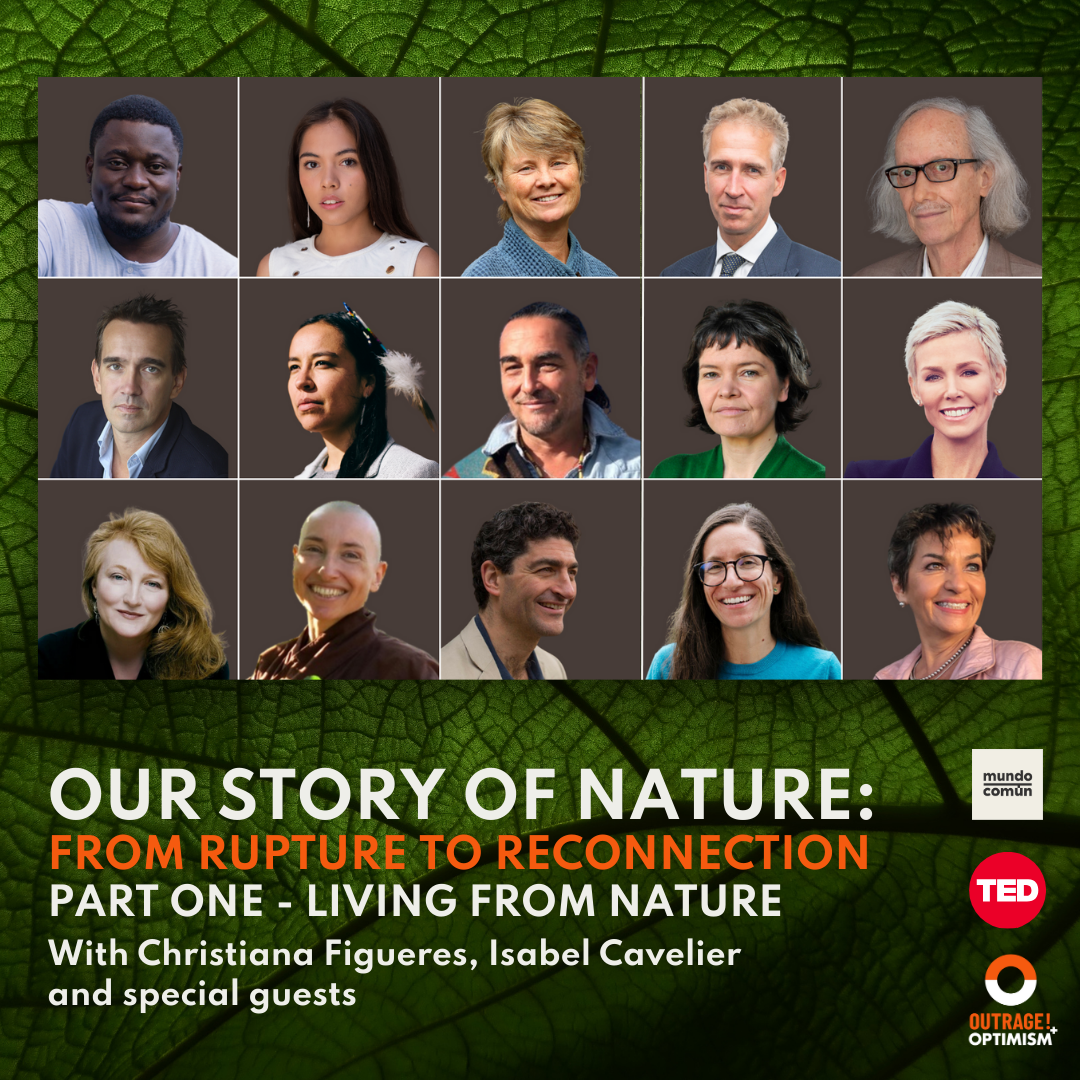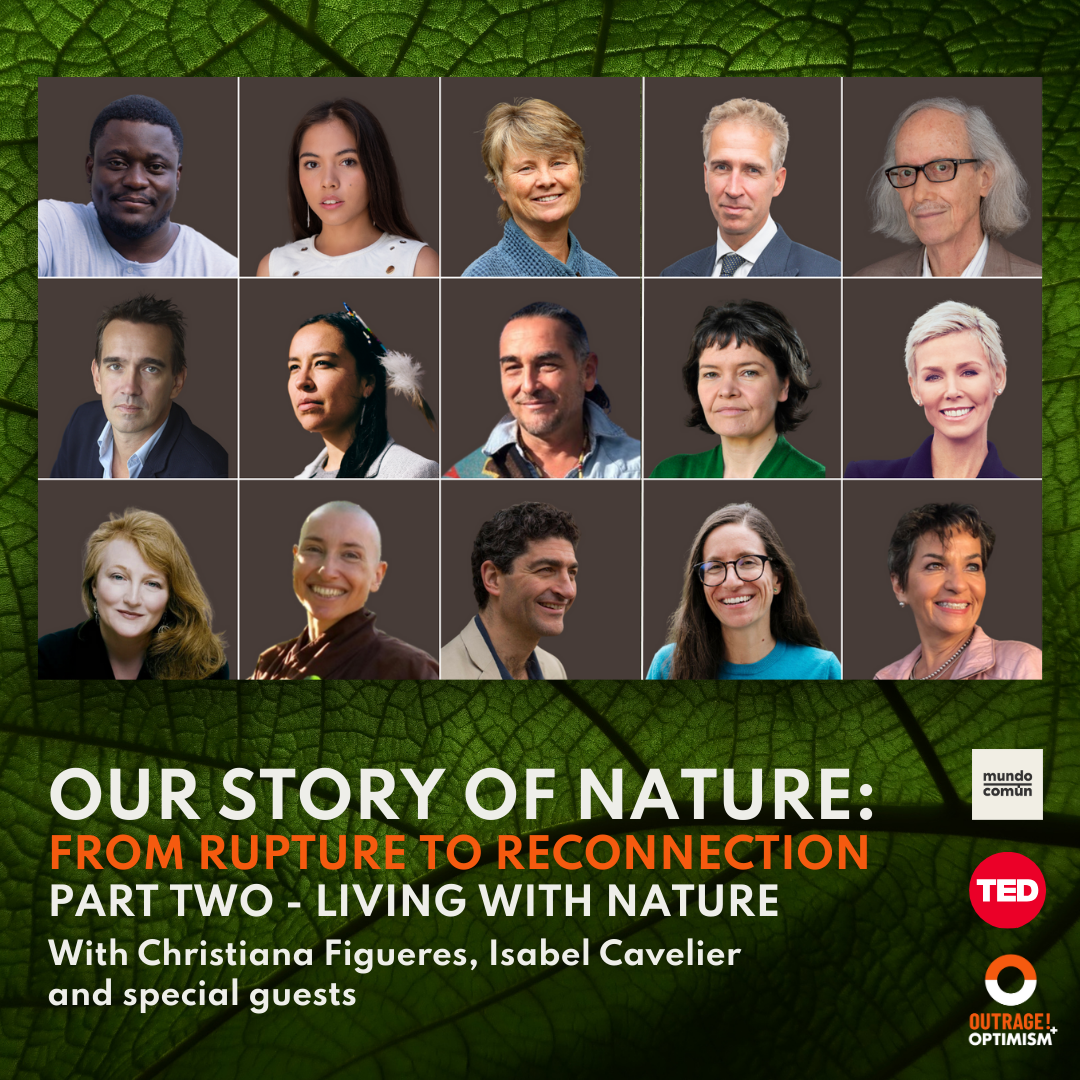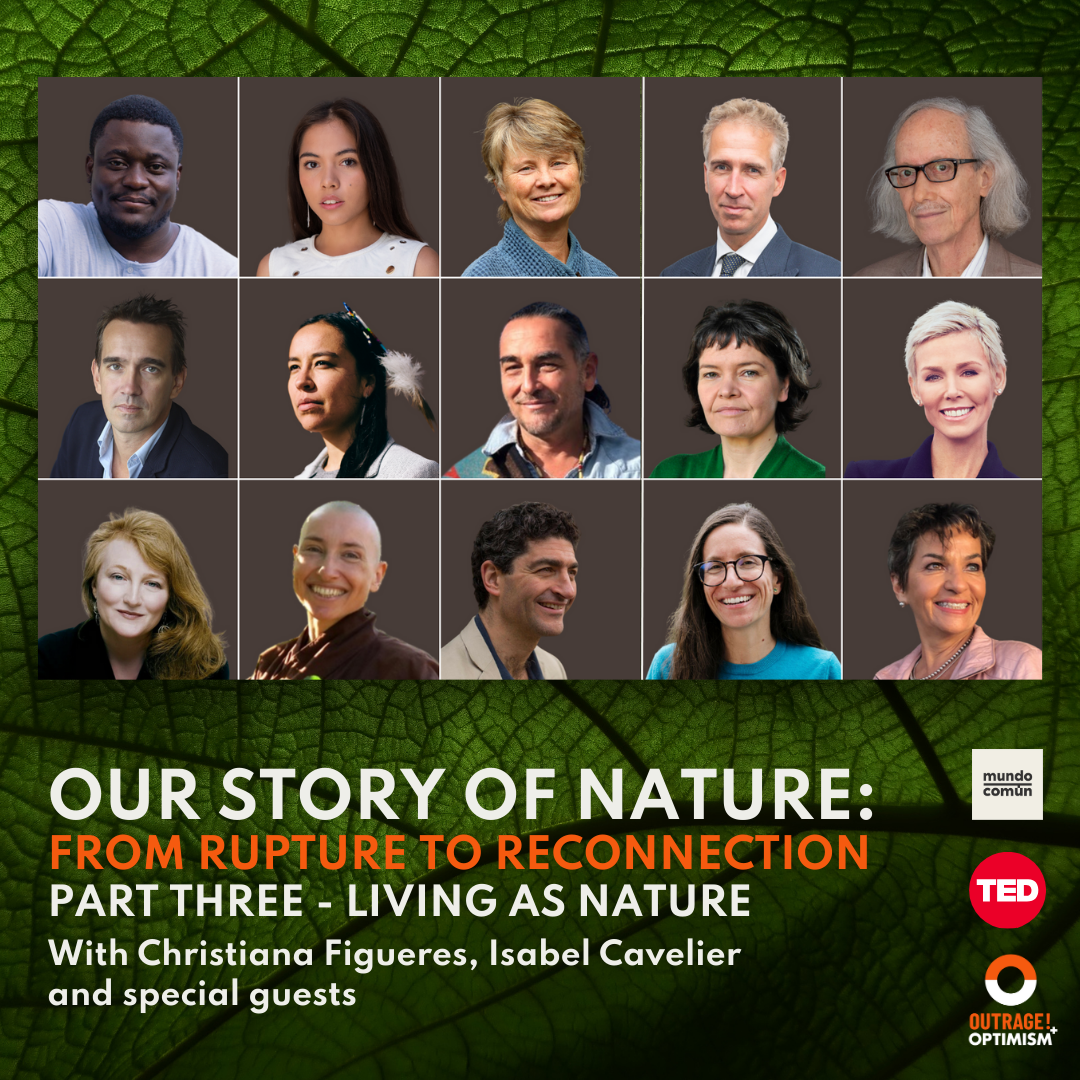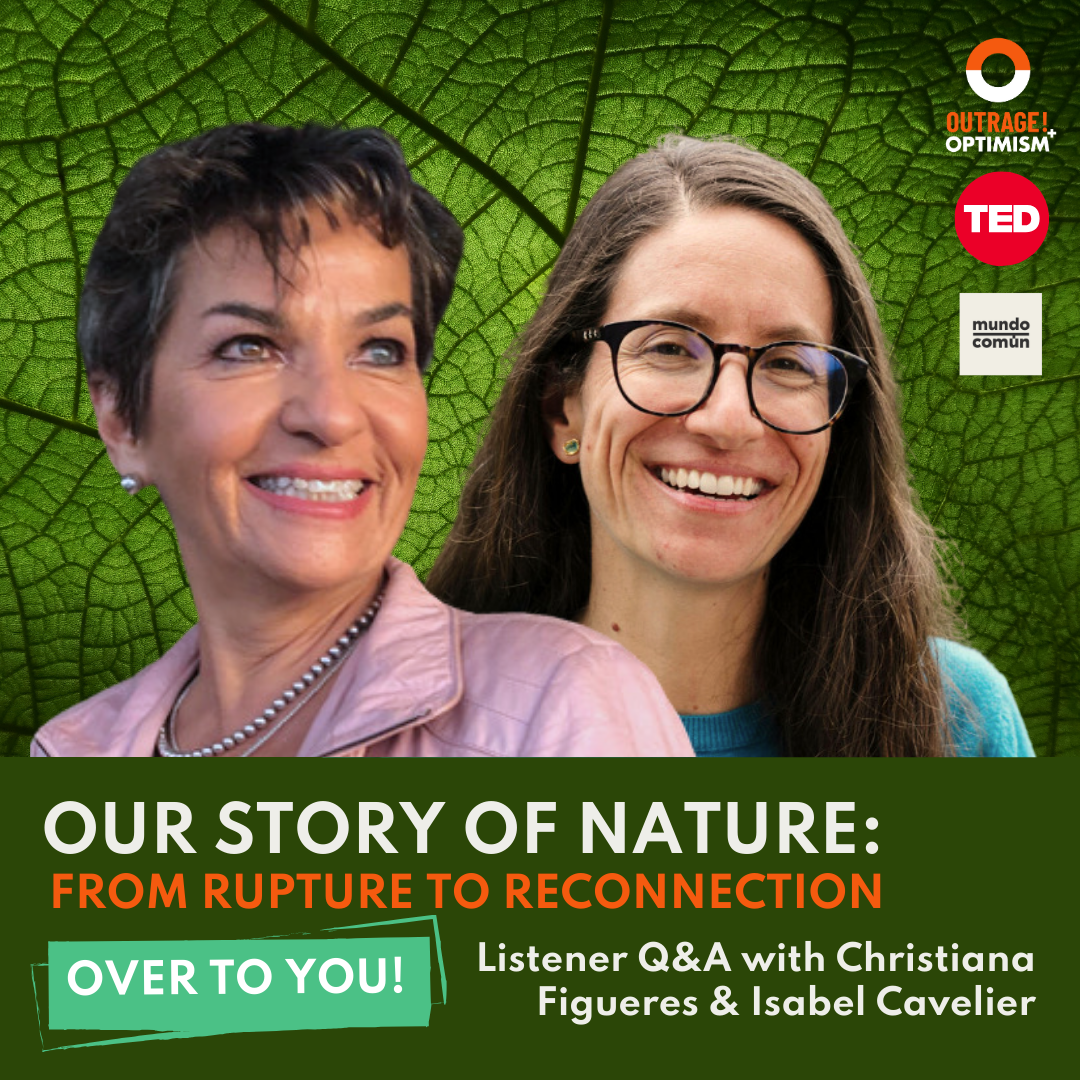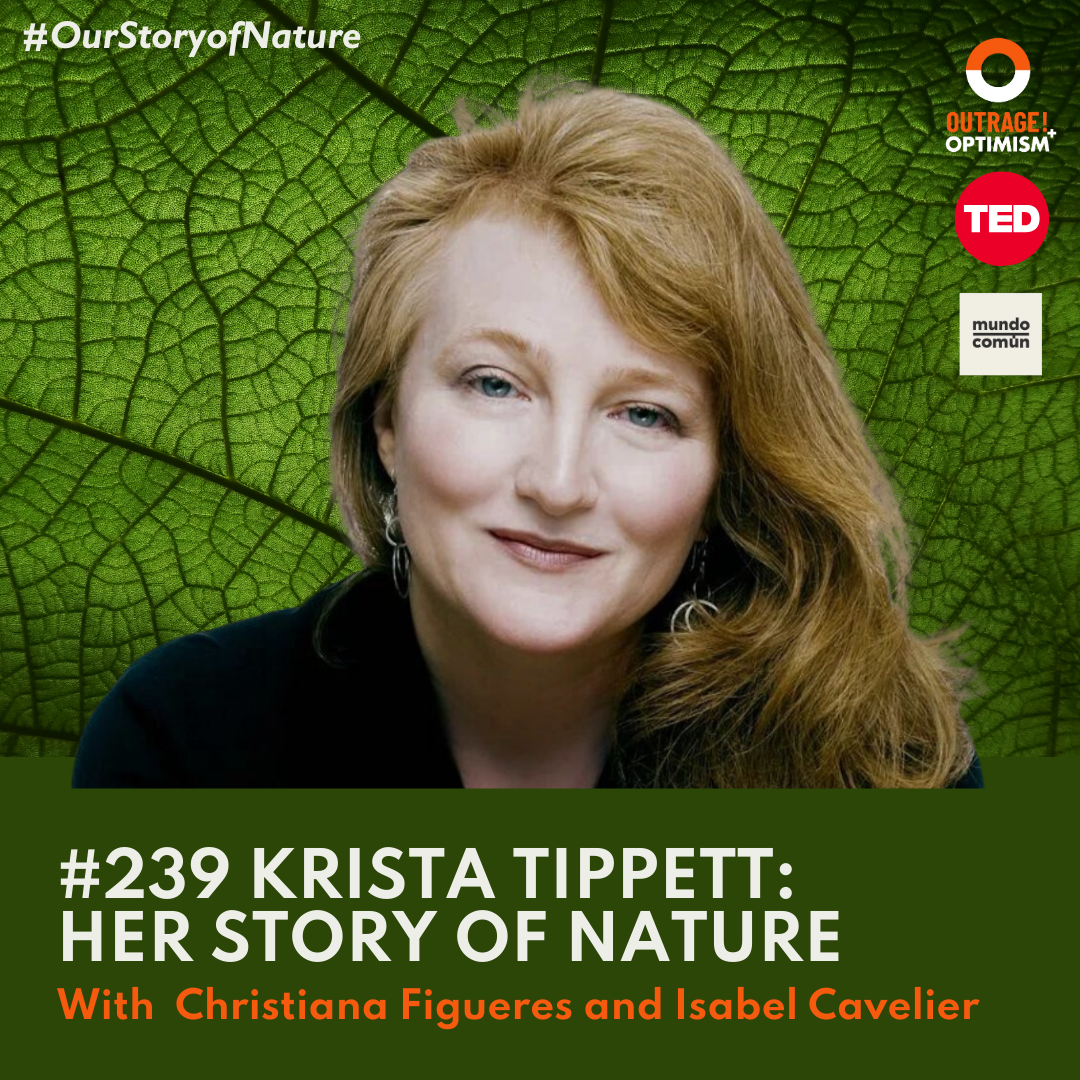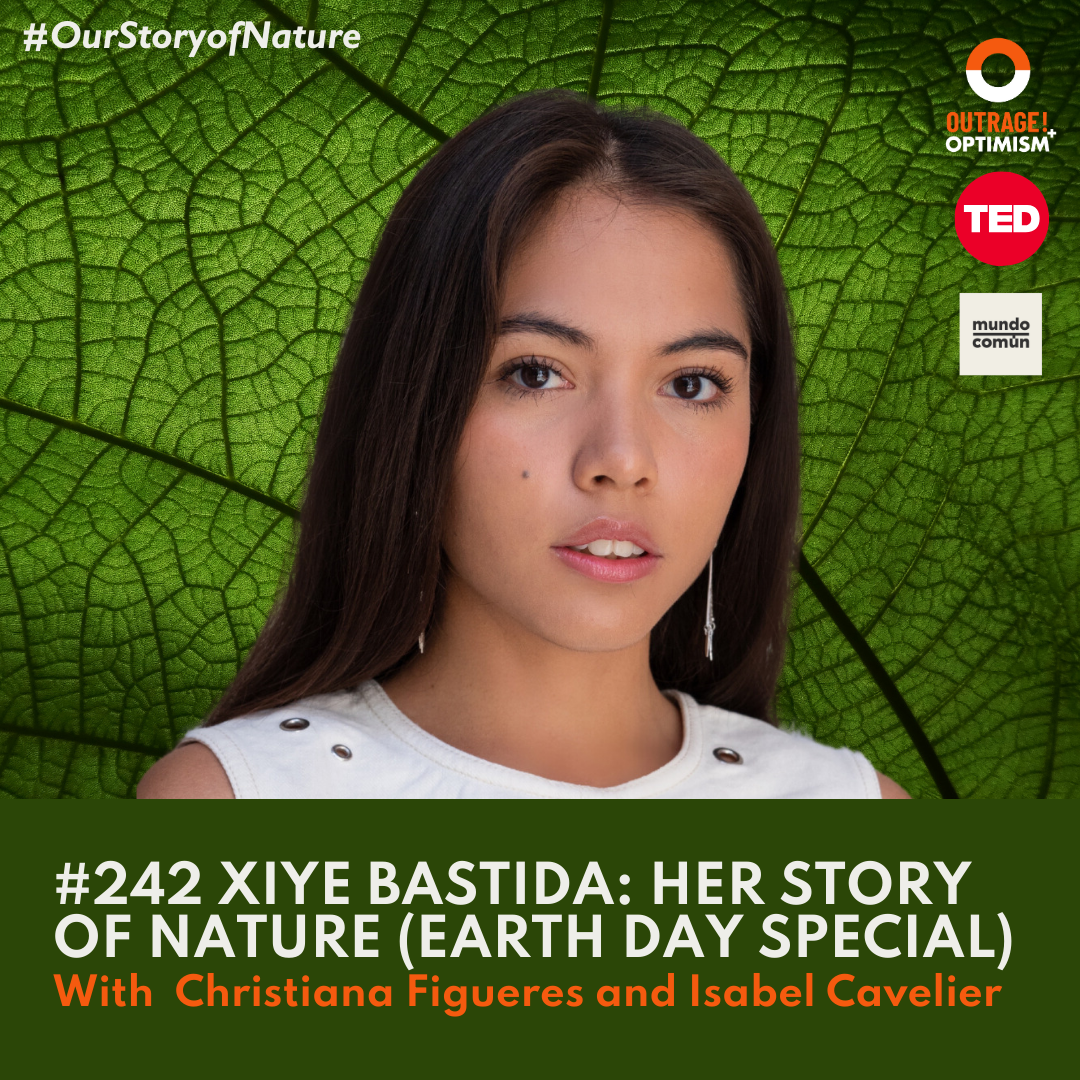225: COP28: The Snapshot vs The Movie
About this episode
With much of the world’s media focusing on the language of the final text at COP 28 to determine the success or failure of the COP and Dr Sultan’s presidency, Tom, with the help of friend of the show and High Level Climate Champion for COP 26, Nigel Topping; and H.E. Razan Al Mubarak, UN Climate Change High Level Champion for COP 28, take a different lens on what has been unfolding at COP 28 aside from the phase out/down controversy.
NOTES AND RESOURCES
H.E. Razan Al Mubarak, UN Climate Change High-Level Champion from the COP28 Presidency
LinkedIn | Instagram | Twitter | Facebook | Website
Nigel Topping, Member of the Climate Change Committee (CCC) / Non-executive director of the UK Infrastructure Bank (UKIB)
Twitter | LinkedIn
Listen to O+O regularly? Please fill out our 10 minute survey - We want to hear from you!
Learn more about the Paris Agreement.
It’s official, we’re a TED Audio Collective Podcast - Proof!
Check out more podcasts from The TED Audio Collective
Please follow us on social media!
Twitter | Instagram | LinkedIn
Full Transcript
Transcript generated by AI. While we aim for accuracy, errors may still occur. Please refer to the episode’s audio for the definitive version
Tom Rivett-Carnac: [00:00:12] So it is Sunday the 10th of December, it's the afternoon. COP is beginning to really heat up as we focus on the final plenary and so much left on the table for the coming days. And I have to say, I really feel like a historic, transformative outcome is very much within our grasp. But we're not going to talk about that negotiated outcome now. Instead, I'm very honoured to be sitting here with two high level climate action champions, Nigel Topping, Razan Al Mubarak, and I'd love to have a conversation with both of you over the next 20, 25 minutes around how we should think about this COP. It comes at an interesting time, right. It's the end of the hottest year on record. It's hosted in a fossil fuel country. However, there's been an enormous amount of commitments that have come out of the last few years. We've had a fund on loss and damage. We've been fighting for for 30 years, and I've done a lot of interviews over the last few days. And one of the things I would say is journalists are a bit confused about how to interpret it. Some of them are saying it's a binary success failure based on the final text. That seems a bit limited. It obviously has a role and there's been so much else that's happened. Nigel, I'd love to just start with you. You've been in this space for a long time. And just that broad question, how should we think about this COP as to where we are now? Load More
Tom Rivett-Carnac: [00:02:46] So I mean, based on what you're saying there, that's kind of the first COP of the implementation phase. Is that, was that a fair summary of what you just said?
Nigel Topping: [00:02:52] I'm a bit reluctant because every presidency wants to say they're the first people to, the first people to imagine that action matters. But so I wouldn't say that, I think, you know, that many presidencies have tried, but it's a gradual process. But I do think this presidency has really consciously taken it to.
Tom Rivett-Carnac: [00:03:07] A whole new level.
Nigel Topping: [00:03:08] A whole new level. So it's not the first, but it's the most implementation focused. And it does feel qualitatively different.
Tom Rivett-Carnac: [00:03:15] Yes, Razan.
Razan Al Mubarak: [00:03:17] I mean, even though we'd love to take a sort of a credit for, for this momentum, but I really do think it's actually driven by the real economy. And I find that fascinating, because what we are getting now is clarity in the real economy, not just about the problems, but about the solutions. And it is very consistent. It is across sectors and it's across industry. And I know, Nigel, you have much more experience than I do with that respect. But there's also clarity behind very strong goals that we all need to collectively achieve together. So for example, we do talk about the need for decarbonising our supply. But then the goals are how do we triple renewable energy. And I've been trying to bring within that goal also the voice of nature. How do we do that in a way that does not continue to harm nature. How do we do that to and ensure that this is an inclusive economic transition, where indigenous peoples are also part of that transition and are not left behind. For me, this also has been a COP where nature and the role of nature is anchored in not just climate science, but as a fundamental ally for achieving the goals of Paris and really leveraging nature and its ability to deliver a third of our mitigation outcomes by 2030.
Tom Rivett-Carnac: [00:04:49] Yeah, I'd love to just ask one more about that, because, I mean, I think there's been the nature agenda, which I know you've led on for so long, and also the food systems agenda, and that is truly new here. So is there anything you can share about the food systems breakthroughs we've seen? Because I think most people don't really realize that food has not really been incorporated into COPs at all. But it's a third of the challenge and a third of the solutions, right.
Razan Al Mubarak: [00:05:08] Yeah, it's I mean, it's a glaring omission that I'm glad that this COP was able to catch because as we all know, food does contribute to a third of greenhouse gas emissions. It also is a driver for biodiversity loss. So it is in our collective advantage to address food. And I believe this COP through the food declaration that has been signed by more than 135 countries, has really ensured that we address food in a way that is both nature positive and that is, climate neutral. We also need to be able to see those outcomes delivered within the negotiated text. And I know this is not something that we're going to be talking about today, but it's really important that the momentum that has been building up from COP to COP does land within the, within the response to the global stocktake.
Tom Rivett-Carnac: [00:06:13] Well, let's go there just for a second, because I think that is also really important, right. Because I think what I'm hearing you say is that actually the commitments have been considerable up to this point, but it needs to be wrapped together, right, with an outcome that sends this unambiguous message. Because we know the global stocktake was released, we know that it sent a very negative message. We have to be 43% reduced by 2030. We're 9% increase. And in a way, putting our arms around the whole of this, which is something that journalists are struggling to do, we need to be able to give an unambiguous message that the response from Dubai is that we will not drop the ball on that transformation, given how late it's become so unambiguous and the UN doesn't do unambiguous terribly well right. I mean, every response from every COP is to some extent ambiguous because it's negotiated. It has different elements to it. But what would be an unambiguous signal that this COP was going to put us back on track? How would you think about that, Nigel?
Nigel Topping: [00:07:06] Yeah of course. I mean, everybody who listens to the podcast knows the challenges of a consensus based decision making process and delivering unambiguous outcomes. But I think there are there are things that I think you can build consensus around, like, following the science, like 1.5 degrees as a goal that is far preferable for anything, than anything higher than that. I mean, the IPCC has very well demonstrated that the human and economic damage just ratchets up. And we've seen the tipping points work, which reminds us that it's not linear the damage increase, it could just go completely catastrophic. So I think aligning around the science is a solid one. And then I think like, one of the great things about the Emirati Food Systems Declaration, and new countries are adding all the time right. It's a very different dynamic. Instead of getting everyone to agree and then sign, you get 30 to agree, then 50, then 70, then 135, then 150. It's just a very different dynamic, is that every one of those countries has committed to including food systems transformation in their next NDC. So I think another unifying thing could be that every NDC should follow the best available science, cover all gases and all sectors and not just the latest available science of the problems of climate change, but the latest available science of the solutions, as Razan said. So trebling renewables is a good example. But in every other sector. And this was the breakthrough idea that we launched in Glasgow and is now, and Razan's taking it to the next level with so many sectors and we're seeing public and private now starting to converge on what do we need to do by 2030. And that's, it's really important as it de-risks it for everybody. If everyone's trying to treble renewable energy, then it's very different from you trying to treble and me trying to double. So I think, yeah, follow the science 1.5 degrees, all gases, all sectors, and the highest level of ambition that we're seeing collaboratively as well.
Razan Al Mubarak: [00:09:00] Yeah, and then this notion of inclusivity. So yes, you have this, this drive by the presidency. And I think this has been emblematic of the high level champions way of working to ensure that we bring multiple voices around the table. And that has been critical because, as you know, negotiators are talking about tripling renewable energy. It cannot come, as I said before, at the expense of nature. And if we didn't have indigenous peoples in the room or civil society that are working on nature conservation, that can be missed and it can actually be missed. So it's really important that these voices are then translated to ways that are then institutionalized. And the thing is, how do they get institutionalized. So surely, yes, there is this sort of, top down negotiated text, but there's been this groundswell of bottom up approaches. So one way and again, you know, touching about what Nigel was saying was through NDCs, I mean, countries came together again. It wasn't everybody. But starting with the support of non-party stakeholders to say, how do we enhance our NDCs, how do we make them investable, how do we enhance them with nature based solutions. How do we make them more gender responsive and direct financing to indigenous peoples is somehow captured. And it's those moments of institutionalization that I think we need to keep an eye on because they build, you know, as Nigel was saying, every COP builds on the one before it.
Razan Al Mubarak: [00:10:39] The other thing that I found also quite, I think forward looking and inspiring is this sort of convergence between the COPs. So you see it at two different levels. The first one is a COP28 COP30 partnership, which again, I think champions the idea of continuity of the agenda, of not having to reinvent the wheel year on year between, you know, the UAE and Brazil. The other one that was very interesting was one that I was also very privy to was the partnership between the UAE COP28 presidency and China's presidency of COP15. Also sending a political signal that you have.
Tom Rivett-Carnac: [00:11:24] The biodiversity COP.
Razan Al Mubarak: [00:11:24] Yeah, the biodiversity COP, exactly. That there is this also convergence between the Rio conventions. And for administrators, and my past life I was an environmental administrator in Abu Dhabi. It makes our lives much easier when you have templates that speak to each other, reporting metrics that speak to each other when not, because you can't see nature degradation and climate change and development issues any longer in isolation. We can't afford to do so. And I think that's another really strong signal that has been sent from COP28.
Tom Rivett-Carnac: [00:12:01] I love that. Nigel?
Nigel Topping: [00:12:02] Yeah and actually, I think that the kind of by design, the different Rio conventions are separate, often have separate teams negotiating them. And I think increasingly what we're seeing is that the action agenda which transcends the COP, for example, mangroves I mentioned earlier. Well, is that a biodiversity issue or a climate issue. Well, it's obviously both. So you don't, but you don't need two action agendas on that right. So I think this sort of, this broad action agenda which brings together state and non-state public and private, indigenous and local peoples and local communities, the whole value chain, cities and governors can unite in a real world way, which is more in tune with the way people see the world. I mean, people living in a mangrove community don't do biodiversity on Monday and climate on Tuesday right. So I think that common thread of the action agenda is starting to emerge as something really helpful, to keep mobilizing people and you get a double whammy. You can push that forward when you're at the CBD and when you're at the climate COP as well, maybe even at the Desertification COP coming next year, yeah.
Tom Rivett-Carnac: [00:13:11] So, I mean, all of that is such good stuff, right. And, but one of the interesting things is, as the climate regime has become so complicated with all these different elements and you just confess, you can't keep track of all the commitments, right. I mean, and that's a good thing, right. That's something we should applaud. One of the challenges in the world, and this is talking to maybe listeners to this podcast, is they look at the COP and there's so much they kind of can't work it out. And so they can't put their arms around it. And they generally feel a bit like, well, I'm not sure I trust it as a result of that. And that can be very disempowering because COPs seem to play a role of like keeping us on track. But people feel very divorced from the process, which is why we get this obsessive focus on the final closing text, which doesn't reflect the totality. But I'd love to hear what you would say, as two people who know what's happened here really well, to people who are looking at it and struggling to understand in terms of the hope or the challenge left around that this leaves you with, I don't know who wants to start?
Nigel Topping: [00:14:09] I have two thought there. First of all, beware false prophets who tell you that the process is useless, that it's broken, that it doesn't deliver, and that it just needs to be thrown away and start again. They don't actually have any ideas of how to reform the process, right. So it's very easy to say everything's rubbish and be kind of clever about that, but it's like Winston Churchill's famous quote about democracy, it's the worst form of government, except for every other one.
Tom Rivett-Carnac: [00:14:33] Can I say Paul Dickinson has a complete monopoly on quoting Winston Churchill on this podcast, so you can't.
Nigel Topping: [00:14:39] I know Paul would concur with that, but I think it's really important. It frustrates me when people try to be sort of clever and sneery at saying how rubbish the process is and how the fact that it's even being held here is proof that it's failing and all that. It's messy, the world economy is messy. We're trying to solve this collectively. There are, you know, there are masses of people here representing every different kind of voice that there is in the global community. That messiness is a good thing. And yes, it's not a perfect process, but if you're going to criticise it, please come up with a intelligent, reasonable way of reforming it. And when you have a consensus process, that's pretty difficult. So that's the first thing. The second thing is, and Gonzalo made me realise this is, don't just look at the snapshot, look at the movie, look at the change. You know, in 2019, four years ago, I was running We Mean Business then, we were trying to decide should we run a campaign pushing people to go to net zero or not. The science was so, you know, the IPCC only came out five years ago, so it was really only 2019 that we started really focusing on net zero by 2050. We launched relations here in 2020, a year later when there were only a few hundred companies. Now we've got, you've got like.
Razan Al Mubarak: [00:15:48] 13,000.
Tom Rivett-Carnac: [00:15:49] 13,000.
Nigel Topping: [00:15:50] So look, you know, we had, none of these big sectoral commitments like trebling renewable energy or like restoring 15 million hectares of mangroves or like 150 countries signing a food system declaration three years ago. So it's still not perfect. We're are behind track. The stocktake shows us how urgent things are and how scared we should be. But the stocktake also points to how fast some things are changing. And it's the fast changes that we need to accelerate, not just get overwhelmed by the fact that, yeah, maybe we should have started seriously 20 years earlier.
Tom Rivett-Carnac: [00:16:22] Yeah.
Razan Al Mubarak: [00:16:22] And the other thing is, is to admit that it is complex and sometimes trying to, trying to kind of, have a myopic way of explaining things can oversimplify and actually a complex problem and challenge. I mean, we have to remember, we are trying to transform our energy systems, which underpin our economic systems. We are trying to change and transform the way we produce our food. And fundamentally, we are trying to transform our relationship with nature, I mean.
Tom Rivett-Carnac: [00:16:57] Shorthand for pretty much everything actually.
Razan Al Mubarak: [00:16:58] Everything. So, it's huge. It's huge. And I think we need to sort of also recognize, as Nigel said, the complexity of the problem, where we were, where we are today, but fundamentally where we need to go to keep that North Star within reach. 1.5 is an existential limit. It's a biological limit. If we exceed 1.5, our ally nature will no longer be an ally because our carbon sinks will transform into carbon emitters. And we cannot let this happen. And that's why also for me, this was an incredible moment for forests, oceans, mangroves, it was a moment from mountain ridges to reefs, recognizing the incredible power that nature has. But we can only count on it if we keep 1.5 within reach.
Tom Rivett-Carnac: [00:17:56] I love that. Thank you both so much. I need to ask you very quickly what makes you outraged and optimistic. I think you've probably both done this before. Looking at the close of COP, can be quick.
Nigel Topping: [00:18:07] What outrages me is a very small number of countries putting short term national interests ahead of the generational future of the whole of humankind and nature.
Tom Rivett-Carnac: [00:18:18] Feel free to name them if you want to, you don't have to, it's alright.
Nigel Topping: [00:18:22] But everyone knows who they are. And what makes me optimistic is this incredible take up of these bold collaborations converging around short term exponential goals, state and non-state driving that ambition loop that we've all been working so hard and that itself is, I think, infected the whole place here.
Tom Rivett-Carnac: [00:18:41] Amazing.
Razan Al Mubarak: [00:18:42] What outrages me is the potential that the global stocktake will not take into account this incredible momentum that has been built. And so this is something that I hope does not happen, because that would be a huge disservice to the reality that's happening on the ground. And the optimism is just walking around.
Tom Rivett-Carnac: [00:19:05] Amazing.
Razan Al Mubarak: [00:19:05] Walk around, you will see people representing incredible diversity of voices. And in their voices there are messages of hope and messages of solutions and that keeps me very hopeful. Thank you.
Tom Rivett-Carnac: [00:19:19] Amazing, Nigel Topping, Razan Al Mubarak, thank you both so much.
Nigel Topping: [00:19:22] Thanks.
Razan Al Mubarak: [00:19:23] Always fun to be with you guys.
Clay: [00:19:31] Okay, Clay here back in Detroit. Thank you to Her Excellency Razan Al Mubarak and Nigel Topping for joining us on the podcast. Great to have you back again. You can check the show notes to follow them as COP wraps up and beyond. One quick announcement before we go, Outrage + Optimism will have another podcast episode coming out in the next few days, so hit subscribe or follow on your podcast player. We're going to be discussing the final negotiated texts coming out of COP28, so you won't want to miss that. All right, enjoy your week. We will see you right back here in a few days.
Your hosts

Tom Rivett-Carnac
 Follow Tom Rivett-Carnac on Instagram
Follow Tom Rivett-Carnac on Instagram
Guests
